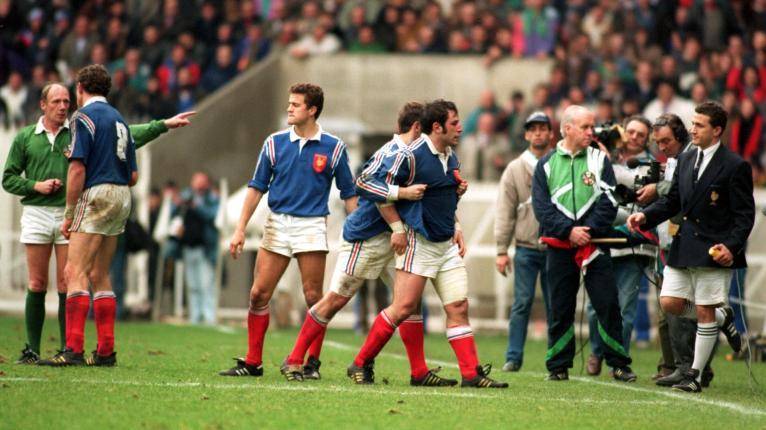'It was nasty, very hostile... a shameful second half'

Former Test referee Owen Doyle has recalled in his new book the infamous 1992 Five Nations Parc des Princes encounter between France and England. The Irish official had taken charge of the championship games between the two countries in 1988 and 1990 in Paris before serving as the fourth official for the 1991 World Cup quarter-final.
The fall-out from that knockout match which was won by England provided an angsty backdrop to the 1992 championship renewal, an x-rated match that became the first and only time that two players from one team were sent off in Five Nations history. French front-rowers Vincent Moscato and Gregoire Lascube were both given their marching orders in a second half that Doyle explained had shamefully nothing to do with rugby.
Writing in The Ref’s Call, Doyle, who retired as a Test referee in 1994 and went on to become IRFU director of referees from 1995 to 2015, provided a colourful insight into the tense rivalry at the time that resulted in the France versus England fixture being branded Le Crunch.
“Before the 1990 fixture, England captain Will Carling asked me if I wouldn’t mind repeating in English anything that I said in French. Not being able to communicate with one of the teams in moments of high tension undoubtedly makes the task more difficult.
“However, no amount of French-speaking could have prevented the events that unfolded in February 1992 in Paris when Stephen Hilditch was the man in the middle, with myself and Brian Stirling his assistants. In fact, had Hilditch been the Master of the Tower of Babel, it would have been to no avail.

“The sides played a torrid encounter at Parc des Princes the previous October in a World Cup quarter-final. The English had torn into the French from the off, and France felt the aggression was way over the top, though they themselves were no shrinking violets. That match was refereed by New Zealander David Bishop, a fine referee, with Hilditch and Bishop’s fellow countryman Keith Lawrence on the touchlines. I was the designated fourth official.”
England went on to win 19-10 to qualify for the World Cup semi-finals, an outcome that left a bad taste for the beaten France. “Nothing was ever going to convince the French that they hadn’t had a rough ride from the referee,” continued Doyle.
“After the match, as we made our way back to the dressing rooms, Daniel Dubroca ‘approached’ David Bishop, manhandling him as he vented his spleen in no uncertain fashion. I wasn’t close enough to hear the actual words but – later on – the word ‘cheat’ was in the air.
“The coach [Dubroca] was left with no choice but to resign and was replaced by former French scum-half Pierre Berbizier just a year after he retired from playing…
“When the Five Nations came around a mere six months after that World Cup meeting, there was no doubt that France were not going to be intimidated in Paris and that neither team would give an inch. The pre-match atmosphere was tense but, given what we had seen in October, no more than we were anticipating. Or so we thought.
“Being frank, nothing could have prepared us for the events of the second half. The last 20 minutes were particularly awful, and nothing to do with rugby. Every ounce of our cumulative experience was needed to keep a modicum of control in what was a shameful second half.
“It was the first, and only, time that two players from one team were sent off in Five Nations history, the French front-rowers Vincent Moscato and Gregoire Lascube both dismissed… Hilditch, Stirling and myself took the brunt of the crowd’s anger. It was nasty, very hostile and very far from the usual crowd reaction to unpopular decisions.
“First, Lascube stamped on Martin Bayfield’s head, an incident I managed to see… It was the first sending-off at Test level on the advice of an assistant referee; it was also an easy call. It was gratuitous and avoidable serious foul play.
“A scrum broke up in complete disarray with punches thrown by both front rows after it appeared that Moscato led with his head. Hilditch read the riot act and was very clear in his instructions.
“There could be no more of it. But as the scrum engaged for the second time, Moscato clearly head-butted Jeff Probyn. Again, the ref was left with absolutely no choice; Moscato was sent off. Determined not to leave the field of play, Philippe Saint-Andre had to escort him off the pitch.”
England eventually beat France 31-13 and unlike now, when disciplinary hearings are held in the midweek after a match, suspensions were handed down to Lascube and Moscato that very same day of the game. “The disciplinary panel met immediately after the match and both French players were suspended for six months; neither would be selected to play for their country again…
“When news of the suspensions filtered back to the hotel, some members of the French Federation were incensed and the normally enjoyable evening was not particularly pleasant. The security escort off the pitch was a good idea, but we didn’t expect to need one at the dinner too.
“On our arrival back in Dublin, we learned that the French Federation had reviewed events and actually extended the length of the suspensions… When we returned the following year for France vs Wales, sincere apologies were forthcoming and we were treated royally throughout the weekend, particularly at the post-match dinner.”























































